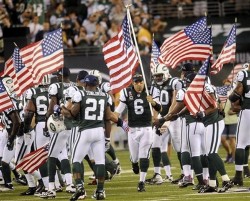Post-9/11, is sports morale still high?
by Jeremy Kelly • October 9, 2011 • Sports • 0 Comments
By JEREMY KELLY

The New York Jets hosted the first Sunday Night Football game of the NFL season at the Meadowlands, and paid their tribute to Sept. 11 before the game.
Following the horrific events of Sept. 11, 2001, nearly all forms of recreation were overshadowed by the grief of a nation. College and professionals postponed sporting events for the following week as the country reflected on what had happened and looked to gain perspective on America in the age of terrorism.
More than a week later, when the sporting world started up again, patriotism was high. The New York Mets had an uplifting win over the Atlanta Braves on Sept. 21, while the NFL games played on Sept. 23 featured players taking American flags onto the field and moments of silence to honor the fallen. It was escapism from the drama, a chance to allow the wounds to heal.
Ten years later, what have we learned?
Has the perspective changed?
When you compare the two eras of professional sports—the one before 9/11 and the one after 9/11—there are similarities. The disputes concerning player salaries, the issues with franchise funding and player behavior are as distinguishable now as they were back then, and, in the opinion of Timothy Holland of the DC Sports Reporter, even worse.
“While growing into a billion dollar industry it has compromised its values for fame and riches,” Holland said in a September examiner.com article. “In this sense it has not changed at all. A tragedy like 9/11 has no impact on the world of sport. Only winning, losing and loss of revenue does.”
Holland cites specific events following Sept. 11, such as the University of Maryland students looting and vandalizing the community following their win in the NCAA Division I Men’s Basketball Championship in 2002.
“Before 9/11 we had player’s strikes,” Holland added. “In 1994, major league baseball shut down its season in August and did not return until 1995. In 1999 the National Basketball Association lost the first half of its season to a player’s strike. After 9/11 strikes turned into lockouts. The National Hockey League owners locked its players out for a full season in 2004-05. National Football League owners locked out their players during the 2011 off season and the NBA has done the same.”
Fans of all sports are arguably more irritated by work stoppages than anything, and following a time where the entire country stopped playing sports to mourn, professional leagues now stop playing to argue. Football fans were on pins and needles from March until July, wondering if the season was going to be postponed; even after the lockout was resolved, players gripe about contracts and salaries.
“My hope is that they stop these money issues,” senior communications student Alex Simon said. “If you’re an athlete, you’re making far more than the average citizen. I hope [players and owners] stop arguing and go back to their instincts like when you were a kid, and just play.”
Helping the healing
Ramapo baseball head coach Rich Martin was only a few months into his tenure when the Sept. 11 attacks occurred.
“I believe [Ramapo Athletics] took 10 days off,” Martin said. “I invited the players to my house to vent and say what they were feeling.”
He went on to mention an HBO film called “9 Innings to Ground Zero.” It showed how the city of New York reacted to Sept. 11, how watching baseball seemed to help viewers heal the wounds and how the Mets gathered at Shea Stadium to give out supplies to people most closely affected by the attacks.
“Certainly [the sports world] is not the same as it was, but I think people approach sports somewhat differently,” Martin added. “They should understand it’s a privilege to have these games.”
For the 10-year anniversary of Sept. 11, opening day in the NFL featured large American flags that were stretched out across the field. The MLB faced controversy when the Mets wanted to wear NYPD, and FDNY hats to honor the men and women who gave their lives on that day; the Mets were subsequently forbidden from doing so.
Despite issues that have gone on—and probably will continue—Simon doesn’t believe that morale in sports is an issue. He acknowledges that because he was only 11 years old at the time, he didn’t quite grasp the severity of 9/11 for what it was. But looking back years later, he knows the scale of what happened and believes that the sports world is benefitting.
“I would say this past decade has been the most dramatic as far as sports,” Simon said. “I do think there’s been a higher sense of satisfaction and an increase in American pride. There are more people today watching sports than there were 10 years ago.”